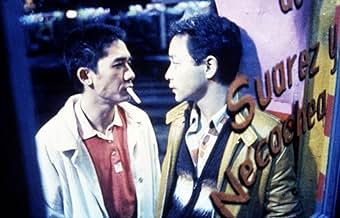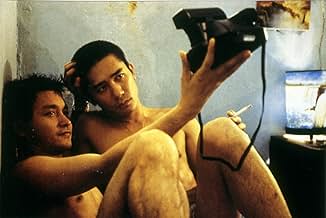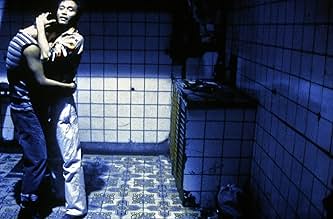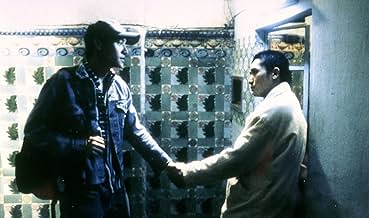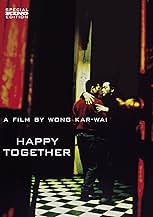AVALIAÇÃO DA IMDb
7,7/10
37 mil
SUA AVALIAÇÃO
Um casal viaja para a Argentina, mas ambos descobrem que suas vidas se separam em direções opostas.Um casal viaja para a Argentina, mas ambos descobrem que suas vidas se separam em direções opostas.Um casal viaja para a Argentina, mas ambos descobrem que suas vidas se separam em direções opostas.
- Direção
- Roteiristas
- Artistas
- Prêmios
- 7 vitórias e 20 indicações no total
Tony Leung Chiu-wai
- Lai Yiu-fai
- (as Tony Chiu Wai Leung)
Shirley Kwan
- Fai's Girlfriend
- (cenas deletadas)
- Direção
- Roteiristas
- Elenco e equipe completos
- Produção, bilheteria e muito mais no IMDbPro
Avaliações em destaque
Just when you thought that you knew everything about Hong Kong cinema or about romantic adventures in film, director Kar Wai Wong steps forward and eliminates all boundaries. Transforming your typical picture of a straight couple and violently handing us the relationship of Yiu-fai and Po-wing using untraditional cinematography is only scratching the surface of this picture. If you found yourself shocked by the opening sequence or annoyed by the drastic image of the film, then you definitely are not a film junkie. This movie had everything a cinephile would desire like strong characters, a non-linear story, and the brazen truth about modern society's relationships. This was more than just a gay film, but instead a story about emotions and loves, coupled with all the turmoil that surrounds it. It is ironic that the title of the film is Happy Together, because it completely challenges the true themes. It is about love, but about the difficulties that surround a dying relationship. From the visual opening to the amazing use of several different cinematography techniques, Happy Together may not suit everyone, but to this film junkie it opened a new door in Hong Kong cinema.
This film would not have worked if it weren't for the apparent brilliance of director Kar Wai Wong. While I have been impressed with his other films like In the Mood for Love and his work on the BMW series, The Hire, this film literally blew me out of the water. To begin, the opening sequence. If this very sexual opening doesn't set the tone for the rest of the film, I don't know what will. I was shocked, disturbed, and on-edge the entire time. I didn't see the love between our two characters at all in the beginning, but that was because it was to show the destruction of their relationship. Then, Wong did several things that just impressed me and kept my attention focused on the film. First, he took these two vacationing men from Hong Kong and set them in a foreign city. So, not only was it uneasy to watch this relationship disintegrate in front of our eyes, but to be lost in a unfamiliar city only made it worse. Second, he focused the camera on only one of the characters (Yiu-fai) to enhance that sensation about Po-wing's indiscretions. Through Yiu-fai we felt the human emotions just boil through of having to see a love that only hurt. Finally, he continually changed the cinematography through different scenes. This was impressive because it only added more tension to our characters and themes. Two travelers lost in a foreign country, trying to patch a dying relationship, with a constantly changing cinematic style, was tough to watch but that was the theme that Wong wanted to capture. This is not your typical romantic picture, but instead it showcases the truth about two men that perhaps were not the greatest fit. Even when he throws in the waterfall element, it only adds to the overall theme. The waterfall, to me, represented the falling relationship. Beauty on the outside, a violent tendency as the water falls just like our relationship.
Wong successfully created this tension by hiring some of Hong Kong's best actors. They carried themselves with the greatest of comfort and control. I felt as if I knew these characters by the end of the film. I felt as if I had gone through a similar struggle as they did. These two men challenged the idea of "normal" relationships, yet kept their personas simple, human, and intense. You could not help but feel emotion for these two, even if you did not like the story. They kept the tones light when they needed to be, then brought you deep within the rabbit hole when the darkness erupted. The final scenes of this film are fascinating to watch, and I had to see them again. The downfall of Yiu-fai into a role similar to Po-wing was heartbreaking, yet stunning. Here we have two men who I thought were complete opposites from the beginning, yet somehow, to quote Wong, "Turns out that lonely people are all the same."
Finally, I cannot finish without saying that the cinematography was outstanding in this film. The use of black and white in the beginning and slowly bringing in the colors was breathtaking. This film was more than just actors working for a director, but instead a director creating art. Christopher Doyle bulls-eyed the tone of the film and brought forth an intense picture that only complimented Wong's work. It just impresses me to see a film, like Happy Together, where all the elements come together and work in unison. It is a rarity in today's Hollywood, but thankfully we have directors like Kar Wai Wong whom embrace it. From the beginning of the movie until the final scenes, Doyle challenges an brings together some of the most beautiful scenes in cinema, transforming the normal into the extraordinary.
Overall, this was a spectacular film. After I watched it the first time, I had to see it again, but didn't know if I could. Its emotional strength was so overwhelming that I had to stop myself. I couldn't watch these two brilliant actors tear my heart apart again. It was a sad film, it was an angry film, but most importantly it was a film about being lost in love. Those who may have enjoyed Lost in Translation, this would be a great film to match with it. While not structured the same, it does give us that feeling of being apart in a new world, struggling to get home or to discover one's self. Wong is one of the greatest directors in the world, and I cannot wait to open my soul to his work again. Brilliant film-making, determined and unmatched acting, coupled with the best cinematography this world has ever encountered! A must for everyone!
Grade: **** out of *****
This film would not have worked if it weren't for the apparent brilliance of director Kar Wai Wong. While I have been impressed with his other films like In the Mood for Love and his work on the BMW series, The Hire, this film literally blew me out of the water. To begin, the opening sequence. If this very sexual opening doesn't set the tone for the rest of the film, I don't know what will. I was shocked, disturbed, and on-edge the entire time. I didn't see the love between our two characters at all in the beginning, but that was because it was to show the destruction of their relationship. Then, Wong did several things that just impressed me and kept my attention focused on the film. First, he took these two vacationing men from Hong Kong and set them in a foreign city. So, not only was it uneasy to watch this relationship disintegrate in front of our eyes, but to be lost in a unfamiliar city only made it worse. Second, he focused the camera on only one of the characters (Yiu-fai) to enhance that sensation about Po-wing's indiscretions. Through Yiu-fai we felt the human emotions just boil through of having to see a love that only hurt. Finally, he continually changed the cinematography through different scenes. This was impressive because it only added more tension to our characters and themes. Two travelers lost in a foreign country, trying to patch a dying relationship, with a constantly changing cinematic style, was tough to watch but that was the theme that Wong wanted to capture. This is not your typical romantic picture, but instead it showcases the truth about two men that perhaps were not the greatest fit. Even when he throws in the waterfall element, it only adds to the overall theme. The waterfall, to me, represented the falling relationship. Beauty on the outside, a violent tendency as the water falls just like our relationship.
Wong successfully created this tension by hiring some of Hong Kong's best actors. They carried themselves with the greatest of comfort and control. I felt as if I knew these characters by the end of the film. I felt as if I had gone through a similar struggle as they did. These two men challenged the idea of "normal" relationships, yet kept their personas simple, human, and intense. You could not help but feel emotion for these two, even if you did not like the story. They kept the tones light when they needed to be, then brought you deep within the rabbit hole when the darkness erupted. The final scenes of this film are fascinating to watch, and I had to see them again. The downfall of Yiu-fai into a role similar to Po-wing was heartbreaking, yet stunning. Here we have two men who I thought were complete opposites from the beginning, yet somehow, to quote Wong, "Turns out that lonely people are all the same."
Finally, I cannot finish without saying that the cinematography was outstanding in this film. The use of black and white in the beginning and slowly bringing in the colors was breathtaking. This film was more than just actors working for a director, but instead a director creating art. Christopher Doyle bulls-eyed the tone of the film and brought forth an intense picture that only complimented Wong's work. It just impresses me to see a film, like Happy Together, where all the elements come together and work in unison. It is a rarity in today's Hollywood, but thankfully we have directors like Kar Wai Wong whom embrace it. From the beginning of the movie until the final scenes, Doyle challenges an brings together some of the most beautiful scenes in cinema, transforming the normal into the extraordinary.
Overall, this was a spectacular film. After I watched it the first time, I had to see it again, but didn't know if I could. Its emotional strength was so overwhelming that I had to stop myself. I couldn't watch these two brilliant actors tear my heart apart again. It was a sad film, it was an angry film, but most importantly it was a film about being lost in love. Those who may have enjoyed Lost in Translation, this would be a great film to match with it. While not structured the same, it does give us that feeling of being apart in a new world, struggling to get home or to discover one's self. Wong is one of the greatest directors in the world, and I cannot wait to open my soul to his work again. Brilliant film-making, determined and unmatched acting, coupled with the best cinematography this world has ever encountered! A must for everyone!
Grade: **** out of *****
"Happy Together " is essentially a study of a couple falling in and out of love. Their sex - they are a gay couple from Hong Kong - hardly matters: the film could just as well have been about a straight or lesbian couple. The fact that very near the beginning there is as explicit a scene of male anal intercourse as one is likely to encounter in mainstream commercial cinema is far from gratuitously sensational. As the film is meant to start on a passionate high, this is the most convincing way of doing it - so be it. The director has the integrity not to repeat this for the reason that the couple never quite feel the same about each other again - indeed there is a great deal of alienation. Both have arrived in Argentina in search of work. Although the jobs undertaken by one of the pair, Lai, are fairly menial, first as a doorman at a Tango club and then a kitchen worker, he seems more stable than his companion, Ho, who does little but hustle, gets beaten up fairly early on and spends much of his time in an incapacitated state. In the room they share there is a lampshade depicting the Izuazi Falls. The cascade almost becomes a symbol for the relationship they would ideally like to achieve. Early on they hire a car to look for it but lose their way. After their relationship has finally broken Lai finds it, but as he is alone, the landmark seems sadly lacking in excitement. There is a third main character, a straight guy from Taiwan, who works in the kitchen with Lai. With his amiable self-sufficiency he seems to have been introduced to provide a balance to the angst of the main pair, a device that works well as it reinforces our sympathy for them. "Happy Together" looks rough and crude. A hand held camera is used with frenetic nervousness. Sequences of monochrome alternate with scenes that are almost perversely over-coloured. I know it is fashionable to give some films a nightmarish look. Here I found it a distinct stumbling block to be got over for the sake of a work that says so much about loneliness, homesickness and the struggle of people simply to be "happy together".
A poignant portrait of a relationship between two men uprooted from their home country, Happy Together explores the ups and downs, the pros and cons of commitment, as the lead characters careen and collide against each other with their discordant personalities acted out wonderfully.
I didn't think so the first time I saw HAPPY TOGETHER, but I really think this film is a masterpiece. Technically it's amazing - the hand-held camera-work is incredible, and the mindbending shifts from saturated colors to monochrome (which I first felt was a stylish stunt) really underscores the loneliness and alienation of the characters brilliantly - the overall effect by the films' end is devastating.
HAPPY TOGETHER was apparently also - at least partially - inspired by the Argentine novelist Manuel Puig, author of 'Kiss Of The Spider Woman' among many other novels, and Puig's fiction tackles similar issues in a similarly fractured style (filled with footnotes, digressions and sudden shifts in perspective), all to incredibly powerful emotional effect.
If HAPPY TOGETHER is something of an homage to Puig, it's a great one. On it's own it's also a devastating portrait of a disintegrating relationship.
HAPPY TOGETHER was apparently also - at least partially - inspired by the Argentine novelist Manuel Puig, author of 'Kiss Of The Spider Woman' among many other novels, and Puig's fiction tackles similar issues in a similarly fractured style (filled with footnotes, digressions and sudden shifts in perspective), all to incredibly powerful emotional effect.
If HAPPY TOGETHER is something of an homage to Puig, it's a great one. On it's own it's also a devastating portrait of a disintegrating relationship.
In "Happy Together" Director Wong Kar Wai tells us the story of a relationship that does not survive the alienation inside and outside.
The film is set in Argentina where two lovers are stranded because they don't have enough money to return to their native Hong Kong.
The film shows us that Fai and Po-wing are unable to find equality or balance in their relationship. It is a story about the way most relationships are defined by the balance of power.. and how this leads to despair. Fai reflects that their relationship was the happiest when Po-wing was ill and had to be cared for like a child. As Po Wing's health improves Fai draws away from him and refuses his attempts of closeness, illustrated by the constant battles over couch and bed. When Po-Wing is well enough to go out again by himself the balance of the power in relationship shifts. Po-wing slowly but surely slips away into the world of hustling. He never finds his way back to Fai who eventually saves enough money to go home.
Both are emotionally devastated by the loss of their lover. We only see them being happy together in a glimpse, as they dance a slow dance together in their room. It seems the happiness in their relationship that Fai refers to in connection with Po-Wing's illness, is an isolated kind of happiness that he himself enjoys without Po-wing's knowledge. If they are ever indeed Happy Together we see it only in facial expressions, in their tone of voice but these are expressions of love and tenderness that never seem to reach the surface that remain unspoken.
Wong Kar Wai's visual style is absolutely stunning. He conveys the alienation inside the relationship - and the alienation outside - (I am referring to the fact that they are in a different country) through colors and camera-movements. We are constantly looking at the protagonists from a corner high above or through the window of a seedy bar. Every single shot feels claustrophobic and it irritates the viewer. It makes the viewer long for closeness and clarity. It imitates the longing of the characters and their attempts - and failure - at connecting to each other. Their feelings, as does the eye of the lens, float above them in a silent, detached loneliness.
"Happy Together" is one of those films that I do not really enjoy watching. It is actually physically painful to watch because it hurts the eye as much as it hurts the soul. The film makes its style and subject matter into one flesh, a "happy" marriage of form and content.
9/10
The film is set in Argentina where two lovers are stranded because they don't have enough money to return to their native Hong Kong.
The film shows us that Fai and Po-wing are unable to find equality or balance in their relationship. It is a story about the way most relationships are defined by the balance of power.. and how this leads to despair. Fai reflects that their relationship was the happiest when Po-wing was ill and had to be cared for like a child. As Po Wing's health improves Fai draws away from him and refuses his attempts of closeness, illustrated by the constant battles over couch and bed. When Po-Wing is well enough to go out again by himself the balance of the power in relationship shifts. Po-wing slowly but surely slips away into the world of hustling. He never finds his way back to Fai who eventually saves enough money to go home.
Both are emotionally devastated by the loss of their lover. We only see them being happy together in a glimpse, as they dance a slow dance together in their room. It seems the happiness in their relationship that Fai refers to in connection with Po-Wing's illness, is an isolated kind of happiness that he himself enjoys without Po-wing's knowledge. If they are ever indeed Happy Together we see it only in facial expressions, in their tone of voice but these are expressions of love and tenderness that never seem to reach the surface that remain unspoken.
Wong Kar Wai's visual style is absolutely stunning. He conveys the alienation inside the relationship - and the alienation outside - (I am referring to the fact that they are in a different country) through colors and camera-movements. We are constantly looking at the protagonists from a corner high above or through the window of a seedy bar. Every single shot feels claustrophobic and it irritates the viewer. It makes the viewer long for closeness and clarity. It imitates the longing of the characters and their attempts - and failure - at connecting to each other. Their feelings, as does the eye of the lens, float above them in a silent, detached loneliness.
"Happy Together" is one of those films that I do not really enjoy watching. It is actually physically painful to watch because it hurts the eye as much as it hurts the soul. The film makes its style and subject matter into one flesh, a "happy" marriage of form and content.
9/10
Você sabia?
- CuriosidadesChang Chen's storyline was completely improvised. Director Wong Kar-Wai discovered the restaurant, China Central, by chance and, seizing Leslie Cheung's absence due to a concert tour, decided to keep shooting. Chang's plot was thus created.
- Erros de gravaçãoWhen Po-Wing knocks the packs of cigarettes off the clock, it says 2:38, but then it cuts to another angle of him doing this with the clock saying 3:33, and then it cuts again to the clock saying 2:38.
- Citações
Lai Yiu-fai: Turns out that lonely people are all the same.
- Cenas durante ou pós-créditosIn some prints, Jacques Picoux (the French subtitle translator) is listed twice in a row in the closing credits.
- Versões alternativasDuring a fire accident in 2019 while the 4K digital restoration was in progress, some of the original 35mm camera negative was lost. In the ensuing months the negative was attempted to be restored as much possible, but a portion of it had been permanently damaged. Lost was not only some of the picture but also the sound in those reels. As a result, Wong had to shorten some of Tony Leung's monologues, but with the work of the restoration crew of L'Immagine Ritrovata, they managed to restore most of the scenes to better quality.
- ConexõesFeatured in The Movie Show: Episode dated 25 May 1997 (1997)
- Trilhas sonorasCucurrucucu Paloma
by Caetano Veloso
Principais escolhas
Faça login para avaliar e ver a lista de recomendações personalizadas
- How long is Happy Together?Fornecido pela Alexa
Detalhes
- Data de lançamento
- Países de origem
- Idiomas
- Também conhecido como
- Happy Together. Historia de un encuentro
- Locações de filme
- Empresas de produção
- Consulte mais créditos da empresa na IMDbPro
Bilheteria
- Orçamento
- US$ 4.200.000 (estimativa)
- Faturamento bruto nos EUA e Canadá
- US$ 320.319
- Faturamento bruto mundial
- US$ 1.539.811
- Tempo de duração
- 1 h 36 min(96 min)
- Cor
- Mixagem de som
- Proporção
- 1.85 : 1
Contribua para esta página
Sugerir uma alteração ou adicionar conteúdo ausente


